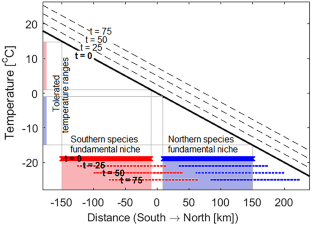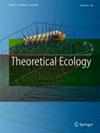当宿主种群向北迁移,但疾病向南迁移:气候变化对疾病传播的反直觉影响
IF 1.1
4区 环境科学与生态学
Q4 ECOLOGY
引用次数: 0
摘要
本文章由计算机程序翻译,如有差异,请以英文原文为准。

When host populations move north, but disease moves south: Counter-intuitive impacts of climate change on disease spread
求助全文
通过发布文献求助,成功后即可免费获取论文全文。
去求助
来源期刊

Theoretical Ecology
环境科学-生态学
CiteScore
3.30
自引率
6.20%
发文量
23
审稿时长
>12 weeks
期刊介绍:
Theoretical Ecology publishes innovative research in theoretical ecology, broadly defined. Papers should use theoretical approaches to answer questions of ecological interest and appeal to and be readable by a broad audience of ecologists. Work that uses mathematical, statistical, computational, or conceptual approaches is all welcomed, provided that the goal is to increase ecological understanding. Papers that only use existing approaches to analyze data, or are only mathematical analyses that do not further ecological understanding, are not appropriate. Work that bridges disciplinary boundaries, such as the intersection between quantitative social sciences and ecology, or physical influences on ecological processes, will also be particularly welcome.
All areas of theoretical ecology, including ecophysiology, population ecology, behavioral ecology, evolutionary ecology, ecosystem ecology, community ecology, and ecosystem and landscape ecology are all appropriate. Theoretical papers that focus on applied ecological questions are also of particular interest.
 求助内容:
求助内容: 应助结果提醒方式:
应助结果提醒方式:


